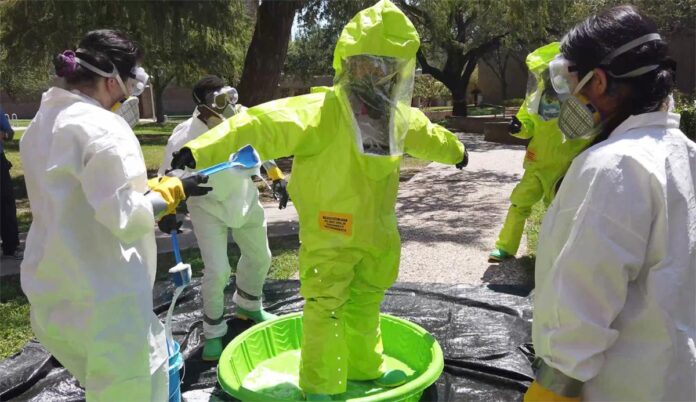By Maria Elena Hernandez, UTRGV Staff
More than a dozen UTRGV students recently earned a certification that not only can help keep the environment safe from hazardous materials, but also make them better job candidates.
“They love it. They are excited,” said Dr. Chu-Lin Cheng, UTRGV associate professor in the School of Earth, Environmental, and Marine Sciences and Department of Civil Engineering who oversaw the Hazardous Waste Operations and Emergency Response (HAZWOPER) training, held on the UTRGV Edinburg Campus in August.
“This certification was designed to couple with my hydrology class in environmental science,” he said. “It’s especially designed for students in environmental science and civil engineering, but we do have students from other majors, like biology and education.”
HAZWOPER training, which deals with the cleanup and removal of hazardous substances, is a week-long, 40-hour training.
“The highlight of the whole training, of course, is the simulated site,” he said. “They get to wear the whole Level A suit, with the oxygen tank inside the suit with them. They have to walk in very hot weather, in hot temperatures and then get the drum (of hazardous material) removed, contained, and then go to the decontamination site.”
He said the students know the importance of the soil and water they’ll protect using the training provided.
“Land and water are our priority in our environment. Without those resources, we cannot sustain our community,” Cheng said.
The number of students participating has increased since trainings started in 2017.
“I am very excited about the increasing numbers throughout these years,” he said.
In March, the program had planned two sections to accommodate the 37 students who signed up for the training – a record high for the program.
“Then the pandemic happened,” Cheng said. “But still, 17 students were able to complete the training and get their certificate this past summer.”
Normally certification would cost hundreds of dollars. B,ut UTRGV SHIP-GEO a National Science Foundation-funded project aiming to attract more Hispanics into the geosciences, works with the Prevention, Preparedness, And Response Academy to provide career training.
“So, the students actually pay a very low fee, only like $50,” he said.
The students are aware HAZWOPER training is required for many environmental consultant job opportunities, and job candidates with certification already save employers the cost of paying for the certification.
“That actually gives them an extra edge getting into the field, because it qualifies them to work and supervise projects at contaminated sites,” he said. “We have a good record of past students getting into environmental consulting because they took the HAZWOPER training in the past.”
To learn more about the classes and programs available in the UTRGV School of Earth, Environmental, and Marine Sciences, visit utrgv.edu/seems.




